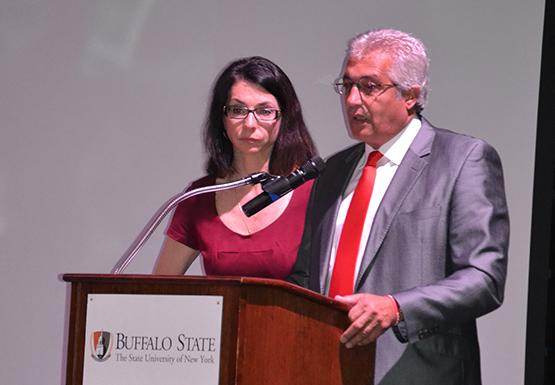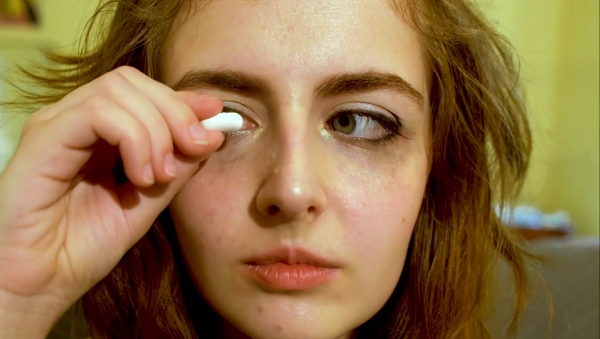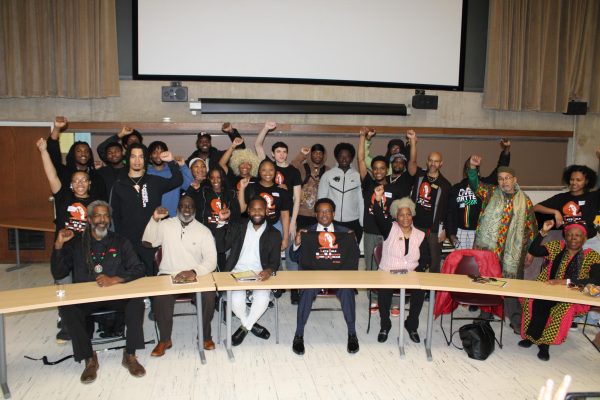Major anti-painkiller campaign launches from campus

Julie and Avi Israel, who lost their son to painkiller abuse, speak at the launch of “Painkiller Kill More than Pain.”
A massive campaign to stop prescription painkiller abuse launched Wednesday on campus.
Called “Painkillers Kill More than Pain,” the campaign is designed to educate the public about the dangers of painkiller addiction.
The event began at 10 a.m. in the Social Hall on the third floor of Campbell Student Union. It was attended by students, media and activists from around the community.
In attendance were many representatives of the organizations responsible for the campaign, including BlueCross BlueShield Western New York, Horizon Health Services and PBS Western New York. Families of young people who lost their lives to addiction also attended.
“We’re going to educate and we’re going to raise awareness,” said Gretchen Fierle, vice president of Blue Cross Blue Shield, who acted as master of ceremonies.
According to Fierle, 65 percent of young drug users in Western New York choose painkillers.
Anne Constantino, the president of Horizon Health Services, and Dick Gallagher, co-founder of Kids Escaping Drugs, offered more chilling facts. They compared painkillers to another opiate, heroin.
According to Constantino, fatal overdoses have gone up 415 percent over the past ten years. She said that 55 percent of painkiller addicts first get the drugs from family or friends. And according to Gallagher, for 50 years the number one cause of death in young people was automobile accidents.
Now, it’s overdoses.
“Tragedies from this disease are preventable,” Constantino said. “Every day I see people turn around and I know recovery is the solution.”
Gallagher also criticized the government’s attitude toward drug rehabilitation. He noted that they could build a new general store in a year, but a rehab facility would take five. He said that the government prioritizes business over health and demanded change.
Parents, Avi and Julie Israel, lost their son Michael to painkiller addiction. Michael Israel began taking painkillers to manage his Crohn’s Disease. The Israel’s said that when their son told them about his addiction, they were at a loss. They did not know about painkiller addiction and didn’t understand what it meant to be addicted.
After their son’s death, they went to BlueCross BlueShield in search of an explanation.
According to the president of the company’s Western New York branch, David Anderson, this made BlueCross BlueShield rethink their policies. They decided that they needed to do more to uphold their mission to serve.
Over 100 meetings later and with the help of 54 new partners, the I-STOP Law was created. It requires physicians to check a database that lists a patient’s history of drug use before prescribing controlled substances. The law was passed in August and is the first of its kind in the country.
Now, the organizers of Painkillers Kill More than Pain are focused on informing the public. During the event, they revealed their radio, television and online advertisements, as well as a preview of their website. They also previewed their documentary, which will be broadcast later this month and then distributed to schools throughout the region.
“This is a winnable war,” Avi Israel said. “And we can do it.”
Before the event ended, the organizers invited Buffalo State students to be the first to sign a pledge card stating they would not abuse painkillers. Students were also given information pamphlets to distribute around campus.
Students at the event were surprised and impressed by the campaign.
“I didn’t think painkillers were a big deal before,” said Shiloh Giess, an engineering senior. “I was on painkillers. I didn’t know you could get addicted. I thought painkillers were safe because a doctor prescribed them.”
Jernisa Reed, a senior, said that she knows more about painkillers from the presentation about the use of painkillers. She also thought the media campaign was very effective.
“If you put it on TV, more kids will see it,” Reed said.
The Painkillers Kill More than Pain documentary will be broadcast on Oct. 22 on WNED and other stations. For more information about the campaign, students can visit painkillersKILL.org.
Email: [email protected]






